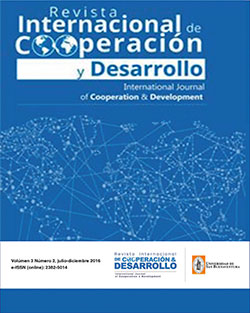INTERNATIONAL JOURNAL OF COOPERATION AND DEVELOPMENT
Assignment of Rights
Authorization for reproduction, publication, communication and distribution of a literary, artistic or scientific
Work.
I , ____________________________________________, author of the book and / or article , of legal age , resident of the city of _________________ , identified with citizenship / passport n° ______________________ issued on _______________________, in exercise of his physical and mental faculties , part henceforth be called the AUTHOR , supports the following authorization to the reproduction, publication, communication and distribution of a work, perform the following terms:
1. Regardless of current legal regulations due to the linking of the parties to this contract, and any kind of legal presumption , the parties agree that the AUTHOR authorize ( name of the publisher ) to reproduce , publish , communicate and distribute the material referred to in the International Journal of Cooperation and Development of the University of San Buenaventura.
2. Such authorization lies in particular on the copyright of the work, by any means known or unknown, publication of the work, distribution of the work , either directly or through third parties for purely educational purposes.
3. AUTHOR agrees to report and declare the existence of this authorization and to preserve the right of the International Journal of Cooperation and Development of the first publication of the work.
4. AUTHOR declares that the article is original and that it is his sole creation, no impediment of any kind exist for the authorization he is doing, besides being responsible for any action claim, plagiarism or other type of claim that might arise about .
5. Such permission is free of charge.
6. Moral copyright in the article are solely the AUTHOR and the University of San Buenaventura expressly agrees to recognize and respect them rigorously.
The Author and / or AUTHORS
SIGNATURE
Abstract
Globalization, the liberalization of international markets and intensification of international cooperation pushed the widespread expansion of privatization of public services. Whether privatization has served the public interest remains unclear. This paper presents the case of Armenia, a country in transition that has undergone an intensive privatization process in the water sector. Top-down
assessments show that Armenian utilities reached above-average rankings in international comparisons. Household surveys were used to provide empirical evidence on the real experiences of households through measuring the households’ perception on water services, the willingness to pay and conservation actions. The results shows that households, overall, are satisfied with water services. The highest share of those who are willing to pay for improvements is in rural areas reflecting a greater need for better water services. As expected, the households’ financial situations and the perception of the price of water affect the willingness to pay. The results of the research gave proof to the social comparison theory according to which a lower level of public satisfaction with water services can be derived in areas that neighbor other areas with better water supply services. The study also finds that universal water metering impacted household water consumption behavior.
Keywords:
References
Boscov-Ellen, L. 2009. Thirst for Profit: Corporate Control of Water in Latin America, Council on Hemispheric Affairs. URL: http://www.commondreams.org/views/2009/06/20/thirst-profit-
corporate-control-water-latin-america
Chia, G. et al. 2007. Water Privatization in Manila, Philippines Should Water be Privatized? Economics & Management in Developing
Countries, INSEAD, URL: http://www.circleofblue.org/wpcontent/uploads/2012/06/Insead_Water_Privatization_Manila_Philippines.pdf
Davidson, S. (2014). Why is privatization so controversial. Policy, Vol. 30 No. 1, Autumn 2014, URL: https://www.cis.org.au/app/uploads/2015/04/images/stories/policy-magazine/2014-autumn/30-1-14-davidson-sinclair.pdf
Doyle, J. K. (2005). Face-to-face surveys. In B.S. Everitt and D. Howell, eds., The Encyclopedia of Statistics in Behavioral Science. New York: Wiley.
Festinger, L. (1954). A Theory of Social Comparison Processes. URL: https://www.humanscience.org/docs/Festinger%20(1954)%20
A%20Theory%20of%20Social%20Comparison%20Processes.pdf
Hall, D. and E. Lobina. (2008). Water privatization. Public Services International Research Unit, London. URL: http://gala.gre.ac.uk/1704/1/PSIRU_Report_(9820)_-_2008-04-W-over.
Harutyunyan, N. (2012). State versus Private Sector Provision of Water Services in Armenia. Frontiers of Environmental Science and
Engineering, Vol. 6, p. 620-630.
Harutyunyan, N. (2014 a). Metering drinking water in Armenia: The process and impacts. Sustainable Cities and Society, V 14, p. 351-
358.
Harutyunyan, N. (2014 b). Alternative partnership models for water governance: a case study in Armenia. WIT Transactions on Ecology
and the Environment, Vol. 191, p. 1609-1620, WIT Press, Arshurst, UK, ISSN 1743-3541, doi:10.2495/SC141372. URL: http://www.witpress.
com/elibrary/wit-transactions-on-ecology-and-the environment/191/29628
Harutyunyan, N. (2016). Public perception of water price and service quality: An empirical analysis of household water delivery in Armenia.
Armenian Journal of Economics, Vol. 2, pp. 1- 40.
Lee, T. (2009). A Survey of Public Perceptions and Attitudes Towards Water in Wheatland County. Miistakis Institute, Calgary. URL: http://www.rockies.ca/files/reports/A%20Survey%20of%20Public%20Perceptions%20and%20Attitudes%20Towards%20Water%20in%20
Wheatland%20County.pdf
Mkhitaryan, L. (2009). Towards Performance Based Utility Sector in Armenia: Case of Drinking Water Supply Service. The Caucasus
Research Resource Centers – Armenia. Research #C08-0198.
Nicklaus, D. (2014). Privatization is common but still controversial. St. Louis Post-Dispatch. Feb 11, 2014 URL: http://www.stltoday.com/
business/columns/david-nicklaus/privatization-is-common-but-still-controversial/article_cf1bb072-da21-542f-8fd1-e8ec-002f9ed7.html
Taylor, S. and M., Lobel.(1989). Social Comparison Activity Under Threat: Downward Evaluation and Upward Contacts, Psychological
Review, Vol. 96, No. 4, 569-575. URL: https://taylorlab.psych.ucla.edu/wp-content/uploads/sites/5/2014/10/1989_Social-Comparison-Activity-Under-Threat.pdf
World Bank (WB). (2005). Trade Liberalization: Why So Much Controversy? In Economic Growth in the 1990s. URL: http://www1.worldbank.org/prem/lessons1990s/chaps/05Ch05_kl.pdf














